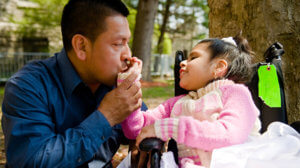Children with Special Needs
Children with special health care needs may need emergency medical care more often due to their complex medical conditions. You are the expert on your child’s condition. Being prepared can help decrease the time it takes for your child to receive the proper care, will reduce your stress level, and will help you think more clearly during a medical emergency. Here are some tips to consider.
At Home:
- Stop by BVA to obtain an EMS Alert, or download a copy here.
- Complete an EMS Alert for each member of your family and post it on your refrigerator. Remember to regularly review, update & date the information provided. First responders will look for this form. Include additional information unique to your child, such as their baseline vital signs, equipment needed (oxygen, suction, etc.), procedures to be avoided, etc.
- Create an Emergency Bag to take with you to the hospital. Include necessary supplies for your child, a favorite book, blanket or stuffed animal, and an updated information sheet containing their medical history, allergies, medications, medical supplies needed, medical insurance information, and emergency phone numbers (doctors, family, neighbors).
- Create a back-up plan in case you need to go to the hospital in a hurry. Who can stay with other children in the house? Who can take care of your pets? Does a family member or trusted neighbor have a key to your house?
- Make sure others in your home know how and when to call 911.
- When calling 911, stay on the phone & be calm so you can answer the dispatcher’s questions and follow their instructions. They are trained to provide immediate emergency care over the phone.
- When help arrives, be prepared to tell them what they need to know to treat your child. Include any medications, physicians, and how your child’s signs and symptoms differ now from what is normal for them.
- Contact your utility companies and HVAC contractors to request high priority restoration services.
- Make a plan for back-up emergency support of power, medical equipment, telephones, etc. in case these are down for any length of time.
At Daycare or School:
- Meet with daycare staff, school nurses, and administrators to have a medical emergency plan in place for your child.
- Make sure they have the following information on file:
- parent/guardian contact information
- physician(s) contact information including emergency phone numbers or off-hours numbers
- child’s baseline vital signs, mental status, appearance, condition, etc.
- child’s diagnoses, previous surgeries, hospitalizations
- child’s medications including dosages and how they are given
- allergies
- immunizations
- equipment needed, such as oxygen, suction equipment, etc.
- any procedures to be avoided

